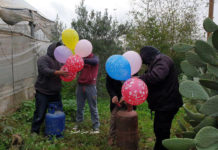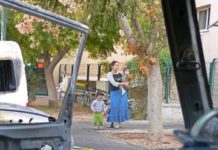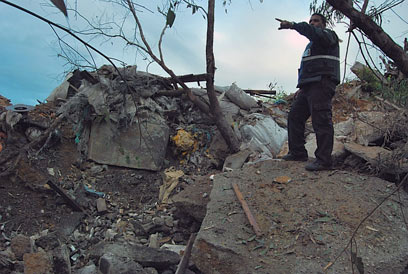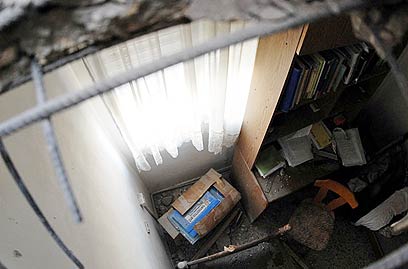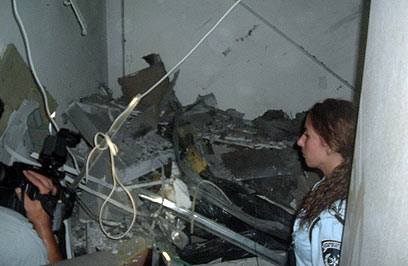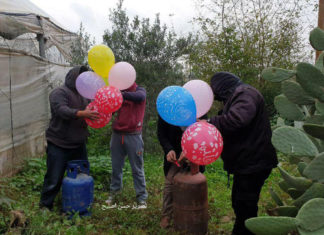Shaked and Maor Harush, 11-year-old twins from Sderot, saw a Qassam rocket explode a few feet away for them, setting a car ablaze. Since then, fear has become an everyday presence in their lives.
Shaked suffers from the worst of the trauma. She refuses to leave home without her parents. A slamming door makes her jump. Any conversation about the security situation is out of the question when Shaked is around, and her family knows to avoid words like Qassam and Color Red altogether.
“Her cousin didn’t think of it, he didn’t know, but Shaked took it hard,” her father said. “She is in bad shape. She suffers from anxiety all the time.” Shaked is not alone. According to a study conducted by Natal, a trauma center for victims of terror and war, 70% of the kids residing in the town that has been on the receiving end of thousands of rockets in recent years are suffering from at least one symptom of posttraumatic stress. A third of all Sderot’s residents suffer from anxiety, and have trouble functioning normally.
Qassam damage in Sderot in April (Photo: Ze’ev Trachtman)
‘Situation only getting worse’
Maor Harush is doing better than his sister; he speaks about his anxieties. Shaked never does. She has been in therapy for three years, but it hasn’t helped – the situation only seems to be getting worse.
“We can’t laugh about the situation, we can’t talk about it,” the twins’ father said. “Most of the time she’s at home, watching television. The television is her connection to the outside world.”
She doesn’t visit her friends, her father said, and her school work has slipped; she suffers from attention disorders.
According to the Natal report, 50% of Sderot’s kids relive the trauma, and 41% suffer from over-excitation – they are constantly alert, ready for danger, and every little noise shakes them up. Twenty percent of the kids suffer from all the symptoms of posttraumatic stress, and 12% have severe trouble functioning.
“They stop playing, stop being interested in their surroundings, detach themselves from their friends and school,” explained Professor Marc Gelkopf, who heads the Natal research team. “One of our newest and most interesting findings is that there is a connection between the symptoms that the parents experience and the ones their children experience. It underlines the importance of family therapy.”
Rocket destroys house in Sderot, 2006 (Photo: Amir Cohen)
The study, which followed 518 adult and 570 kids, showed that one in three residents suffers from the disorder, and that one in seven is having trouble functioning due to anxiety.
“When we’re talking about people suffering from posttraumatic stress, we’re talking about people who wake up in the middle of the night because of nightmares,” Gelkopf said. “People who are over alert… who are afraid to go far from their fortified rooms or visit places that remind them of the danger.”
Despite the recent calm, Natal has found that nearly 30% of the residents feel threatened. Another 23% take anti-depression or anxiety drugs, or use sleeping pills.
‘I’m not the mother I used to be’
Esther Itiel, 56, has been living in Sderot for 30 years. She is another victim of posttraumatic stress.
“Life in this town was beautiful before the Qassam fire started,” she said. “Since then, there hasn’t been one night when we could sleep normally. All aspects of life have been disrupted.
“I managed to survive somehow for years, but when a Qassam fell a few meters near my house, I broke down,” she said. “I took my daughters and moved to Givat Shmuel, leaving my husband and three other kids behind in Sderot.”
In the central town of Givat Shmuel, Itiel received therapy from Natal and the municipality, and graudally managed to regain some of her former self. She agreed to return to Sderot after a shelter was built in her house. Back at home, anxiety hit again.
Qassam hits building in Sderot, 2010 (Photo: Ze’ev Trachtman)
“Any noise from an ambulance, bus or plane makes me jump and triggers the anxiety,” she said. “I can’t listen to the news, this whole story about the
These days, Itiel rarely leaves home. Sleep evades her. She showers only when there is someone else at home with her – and even then, she does it quickly.
“I’m afraid that it will be like it was during the Qassam fire
Some 6,400 people who are suffering from posttraumatic stress are treated at the municipal mental health center in Sderot. Some 3,500 kids and 500 teachers and staff members get psychological treatment through the town’s school system. The Resilience Center, which provides counseling, treats 400 people each year, most of them children and teenagers – and the waiting list for treatment is growing.
“Especially during times of calm, people start feeling the tumult on the inside,” said Hila Barzilay, who runs the Resilience Center. “(…) We get kids with serious motor function disorders, kids who weren’t allowed to play outside in groups for years. Many residents’ relationships have suffered. The situation causes critical damage to all aspects of their lives.
“Parenthood here focuses on survival, not on empowerment,” she said. “The teens are the worst off, because they were born into this reality.”
According to Barzilay, the road to recovery is still long. “The residents are resilient, and despite the harsh trauma, most of them function well,” she said. “But the state must help the city rehabilitate, and rehabilitation takes time. There are people whose symptoms awaken years later, and no one can predict when they will erupt.”



